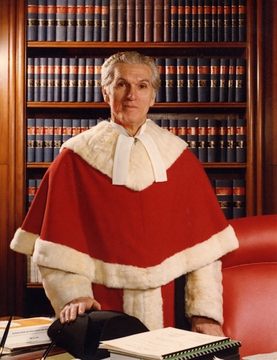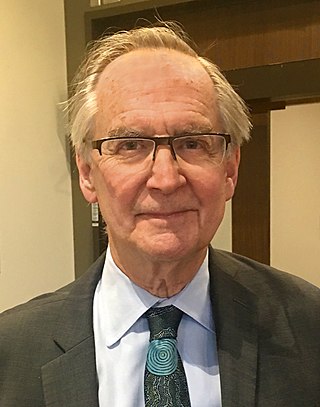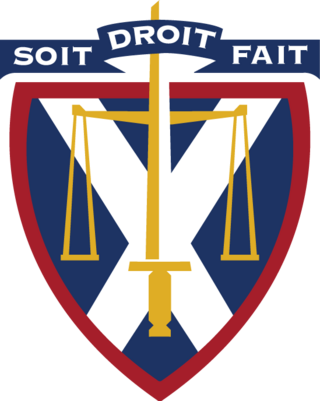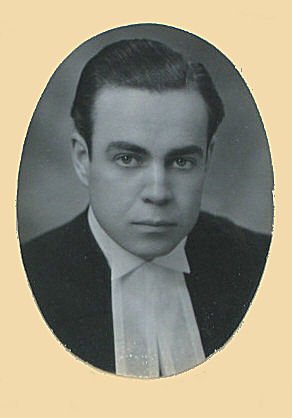Related Research Articles

The Supreme Court of Canada is the highest court in the judicial system of Canada. It comprises nine justices, whose decisions are the ultimate application of Canadian law, and grants permission to between 40 and 75 litigants each year to appeal decisions rendered by provincial, territorial and federal appellate courts. The Supreme Court is bijural, hearing cases from two major legal traditions and bilingual, hearing cases in both official languages of Canada.
The University of Toronto Faculty of Law is the law school of the University of Toronto. Maclean's has consistently assessed the Faculty as the highest ranked common law school in Canada and the highest ranked in terms of faculty journal citations. The Faculty offers the JD, LLM, SJD, MSL, and GPLLM degrees in law.

Osgoode Hall Law School, commonly shortened to Osgoode, is the law school of York University in Toronto, Ontario, Canada. It is home to the Law Commission of Ontario, the Journal of Law and Social Policy, and the Osgoode Hall Law Journal. A variety of LL.M. and Ph.D. degrees in law are available.

Bora Laskin was a Canadian jurist who served as the 14th chief justice of Canada from 1973 to 1984. Laskin was appointed a puisne justice of the Supreme Court in 1970, and served on the Ontario Court of Appeal from 1965 to 1970. Before he was named to the bench, Laskin worked as a lawyer and in academia.

Rosalie Silberman Abella is a Canadian jurist. In 2004, Abella was appointed to the Supreme Court of Canada, becoming the first Jewish woman and refugee to sit on the Canadian Supreme Court bench. She retired from the federal bench in 2021.
The Court of Appeal for Ontario is the appellate court for the province of Ontario, Canada. The seat of the court is Osgoode Hall in downtown Toronto.
The court system of Canada is made up of many courts differing in levels of legal superiority and separated by jurisdiction. In the courts, the judiciary interpret and apply the law of Canada. Some of the courts are federal in nature, while others are provincial or territorial.
Garth Drabinsky is a Canadian film and theatrical producer and entrepreneur. In 2009, he was convicted and sentenced to prison for fraud and forgery. The sentence was reduced from 7 to 5 years in prison, on appeal to the Ontario Court of Appeal, and the Supreme Court of Canada declined to hear a subsequent appeal. In April 2023, a judge dismissed Drabinsky’s defamation lawsuit against American Actor’s Equity for placing him on their ‘Do Not Work’ list, and in July 2024 the 2nd Circuit Court of Appeals affirmed this dismissal, along with his claim that the union's conduct violated antitrust law. Drabinsky has attempted 3 comebacks all resulting in failure and millions of investor dollars being lost.
The Superior Court of Justice is a superior court in Ontario. The Court sits in 52 locations across the province, including 17 Family Court locations, and consists of over 300 federally appointed judges.

William Ian Corneil Binnie is a former puisne justice of the Supreme Court of Canada, serving from January 8, 1998 to October 27, 2011. Of the justices appointed to the Supreme Court in recent years, he is one of the few appointed directly from private practice. On his retirement from the Court, he was described by The Globe and Mail as "arguably the country's premier judge", by La Presse as "probably the most influential judge in Canada of the last decade" and by the Toronto Star as “one of the strongest hands on the court.”

The Queen's University Faculty of Law is a professional faculty of Queen's University at Kingston in Kingston, Ontario, Canada. According to the 2013 Maclean's Magazine Law School Rankings, Queen's is tied for third among law schools in Canada.

Goldwin Arthur Martin was a Canadian lawyer and judge who was known as an expert on criminal law. He was a judge of the Court of Appeal for Ontario from 1973 to 1988.
Kent Roach is a professor of law at the University of Toronto Faculty of Law. He is well known for his expertise and writings on criminal law, the Canadian Charter of Rights and Freedoms, and more recently anti-terrorism law. He is a graduate of the university and served as a law clerk to Justice Bertha Wilson of the Supreme Court of Canada. Roach is a recipient of the Pierre Elliott Trudeau Foundation Fellowship (2013). He was appointed a Member of the Order of Canada in 2015.

Harvey Brownstone is a retired judge of the Ontario Court of Justice and the first openly gay judge in Canada. He is also a bestselling author and host of a television and internet talk show. His interview program "Harvey Brownstone Interviews" is ranked #12 on the Hollywood 411 List of the Top 50 Talk Shows in the World. Variety Entertainment News named "Harvey Brownstone Interviews" one of the "Best Picks for Summer 2024". In 2024, Daily Geek Report's annual list of the Best Talk Shows ranked "Harvey Brownstone Interviews" at #3 on its list of shows with the most noteworthy guests and celebrities, and #2 on its list of the best shows on the planet. Harvey Brownstone was ranked at #1 on its list of most engaging hosts. In August 2024, the Los Angeles Weekly Times ranked "Harvey Brownstone Interviews" at #3 on its "Best of the Best" list of the top internet shows in the world.
David Watt was a Justice of the Court of Appeal for Ontario from 2007 to 2021.
Michael Moldaver is a former Canadian judge. He was a puisne justice on the Supreme Court of Canada from his 2011 appointment by former Prime Minister Stephen Harper until his retirement in 2022. Before his elevation to the nation's top court, he served as a judge at the Ontario Superior Court of Justice and the Court of Appeal for Ontario for over 20 years. A former criminal lawyer, Moldaver is considered an expert in both Canadian criminal law and the Canadian Charter of Rights and Freedoms.
Paul S. Rouleau is a justice of the Court of Appeal for Ontario, Canada. He was the commissioner of the Public Order Emergency Commission that conducted the Inquiry into Emergencies Act mandated by law to study and report on the circumstances that led to the invoking of the Emergencies Act on February 14, 2022 by the government of Prime Minister Justin Trudeau during the Canada convoy protests.

Gloria Jean Epstein is a former judge of the Court of Appeal for Ontario. She had also previously been appointed to the Court of Ontario. She is known for her 1999 trial ruling in M v H that Ontario's Family Law Act was unconstitutional for discriminating against same-sex couples by denying them the same benefits as legally-married heterosexual couples. Epstein's decision was appealed up to the Supreme Court of Canada and upheld.

The Court of Appeal of Prince Edward Island is the appellate court for the Canadian province of Prince Edward Island, and thus the senior provincial court below the Supreme Court of Canada. As the number of appeals heard by the Supreme Court of Canada is extremely limited, the Court of Appeal is in practice the court of final appeal for most residents of Prince Edward Island.

Robert Patrick Armstrong is a Canadian lawyer and retired judge. He served on the Court of Appeal for Ontario from 2002 until his retirement in 2013. Before serving on the bench, Armstrong was a partner at Torys and was lead counsel in the Dubin Inquiry on steroid use in Canadian sports. After leaving the bench, Armstrong joined Arbitration Place, a Canadian group specializing in alternative dispute resolution.
References
- ↑ "The man who got passed over for the Supreme Court". Maclean's. 24 October 2011.
'Every person who is associated with criminal justice would know that David Doherty has written most of the leading judgements in most of the areas,' he told Maclean's. 'He's our leading judge, really. It seems disappointing that he was not chosen.'
- 1 2 Powell, Betsy (2024-08-27). "'The best judge on any court': The longest-serving judge on Ontario's top court retires — with parting words for Doug Ford". Toronto Star. Retrieved 2024-09-12.
- ↑ "Brief Biographical Note of Justice David H. Doherty". Court of Appeal for Ontario. Retrieved December 14, 2011.
- ↑ "Awards".